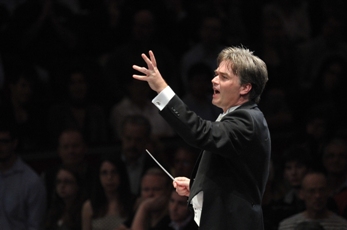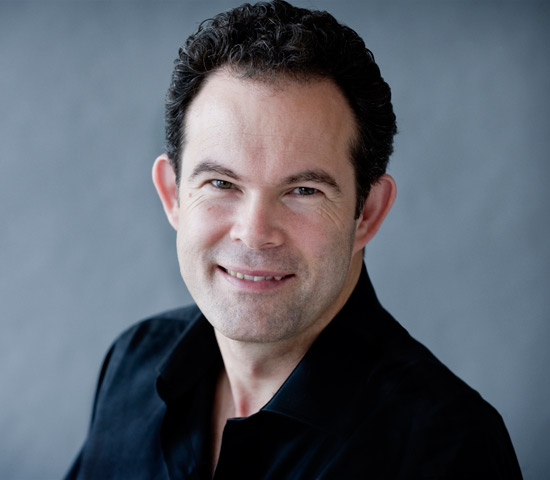BBC Symphony Orchestra, Gardner, Barbican Hall | reviews, news & interviews
BBC Symphony Orchestra, Gardner, Barbican Hall
BBC Symphony Orchestra, Gardner, Barbican Hall
A classic British oratorio framed in exotic orchestral delights

It’s typical: you wait ages for a Belshazzar’s Feast and then two come along at once. And judging by the performance delivered by Ed Gardner and the BBC Symphony Orchestra and Chorus last night, Andrew Nethsingha and his massed Cambridge choirs will have their work cut out to follow it next week at the Royal Festival Hall.
And speaking of gaudy – it was quite the curiosity that Gardner offered us by way of aperitif. Sibelius’s Belshazzar’s Feast Suite is, as Gardner himself rather euphemistically expressed in his mid-concert remarks, a contrasting affair to the Walton. Eschewing the monumentality of the latter, the composer opts instead for a miniature set of movements, bypassing Belshazzar’s climactic death scene in favour of orientalist musical musings.
We lost ourselves among the opulence of Gardner’s orchestral textures
The orchestral equivalent of descriptions of dark flashing eyes and heady scents of spices, these vignettes don’t see Sibelius at his nuanced best. Balancing rather affected contemplation (the second movement duet for solo viola and cello is a graceful exception) with colouristic scene-setting, this incidental music for Hjalmar Procope’s play glories unfashionably in the exotic. There was no faulting the teeth-flashing salesmanship of Gardner (pictured below) and his forces, but it was a novelty that proved just a little too disposable.

Supported and enveloped by magnificent cori spezzati of brass from the balcony, we lost ourselves among the opulence of Gardner’s orchestral textures. Marshalling chamber precision from the BBCSO, his was a reading that honoured the scope of English oratorio, as alien to the tea-urn-and-soggy-biscuits image of this rather Anglican genre as one could wish. Only the endlessly expressive diction of Gerald Finley (rarely have consonants yielded so much distaste as his at the excess of the Babylonians – “Of precious stones, of pearls, of fine linens…”) betrayed the work’s unimpeachably British credentials.
 In an inspired piece of programming, Finley (pictured left) joined the orchestra before the interval for a sequence of Sibelius songs that must surely have been new in performance to most of us. A Swedish translation of Shakespeare’s Come Away, Come Away, Death saw dark vowels and mossy baritonal textures leavened by the unexpected gleam of a harp – one of a sequence of orchestral cameos that showcased Gardner’s ability to read the textural nub of a score. The modal, existential miniature “On a Balcony Beside the Sea” that followed yearns beyond the confines of its form, reaching desperately out towards Wagnerian scope and chromatic release. Both here and in “The Rapids-Rider’s Bride” we perhaps missed those deepest colours that Finley’s voice doesn’t offer, but the narrative energy of this ballad tragedy – shared between the singer and some virtuosic orchestral writing – was in no question.
In an inspired piece of programming, Finley (pictured left) joined the orchestra before the interval for a sequence of Sibelius songs that must surely have been new in performance to most of us. A Swedish translation of Shakespeare’s Come Away, Come Away, Death saw dark vowels and mossy baritonal textures leavened by the unexpected gleam of a harp – one of a sequence of orchestral cameos that showcased Gardner’s ability to read the textural nub of a score. The modal, existential miniature “On a Balcony Beside the Sea” that followed yearns beyond the confines of its form, reaching desperately out towards Wagnerian scope and chromatic release. Both here and in “The Rapids-Rider’s Bride” we perhaps missed those deepest colours that Finley’s voice doesn’t offer, but the narrative energy of this ballad tragedy – shared between the singer and some virtuosic orchestral writing – was in no question.
It seems perhaps perverse to emerge from a concert of such breadth still clinging to the curtain-raiser, but if ever there was a work that could transform this sacrificial altar of a performance slot into something more substantial it’s Benjamin Britten’s Sinfonia Da Requiem. From the tentative graspings in low strings and bassoon that open the Lachrymosa, the work’s through-composed three movements gain bitter and continuous momentum, only redeemed at the last second by the promise of peace offered in the Andante molto tranquillo. The saxophone – the spectral outsider at the orchestral feast – gets arguably its finest mainstream outing in this work, singing an unheeded lament that batters itself into oblivion against the mechanistic hollowness of flutter-tongued flutes and percussion.
This was the BBCSO at their best, with even the back desks of strings bringing the soloistic urgency to their performance that has so transformed Gardner’s English National Opera orchestra pit. In the midst of life (where more clamorously insistent than this season of Nativity?) Gardner and the orchestra plunged us into death and the chill was as brutal as it was exquisite.
Share this article
Add comment
The future of Arts Journalism
You can stop theartsdesk.com closing!
We urgently need financing to survive. Our fundraising drive has thus far raised £49,000 but we need to reach £100,000 or we will be forced to close. Please contribute here: https://gofund.me/c3f6033d
And if you can forward this information to anyone who might assist, we’d be grateful.

Subscribe to theartsdesk.com
Thank you for continuing to read our work on theartsdesk.com. For unlimited access to every article in its entirety, including our archive of more than 15,000 pieces, we're asking for £5 per month or £40 per year. We feel it's a very good deal, and hope you do too.
To take a subscription now simply click here.
And if you're looking for that extra gift for a friend or family member, why not treat them to a theartsdesk.com gift subscription?
more Classical music
 Echo Vocal Ensemble, Latto, Union Chapel review - eclectic choral programme garlanded with dance
Beautiful singing at the heart of an imaginative and stylistically varied concert
Echo Vocal Ensemble, Latto, Union Chapel review - eclectic choral programme garlanded with dance
Beautiful singing at the heart of an imaginative and stylistically varied concert
 Scott, Irish Baroque Orchestra, Whelan, RIAM, Dublin review - towards a Mozart masterpiece
Characteristic joy and enlightenment from this team, but a valveless horn brings problems
Scott, Irish Baroque Orchestra, Whelan, RIAM, Dublin review - towards a Mozart masterpiece
Characteristic joy and enlightenment from this team, but a valveless horn brings problems
 Classical CDs: Voice flutes, flugelhorns and froth
Baroque sonatas, English orchestral music and an emotionally-charged vocal recital
Classical CDs: Voice flutes, flugelhorns and froth
Baroque sonatas, English orchestral music and an emotionally-charged vocal recital
 Kanneh-Mason, Britten Sinfonia, Shave, Milton Court - a grin and a big beaming smile
A pair of striking contemporary pieces alongside two old favourites
Kanneh-Mason, Britten Sinfonia, Shave, Milton Court - a grin and a big beaming smile
A pair of striking contemporary pieces alongside two old favourites
 theartsdesk at the New Ross Piano Festival - Finghin Collins’ musical rainbow
From revelatory Bach played with astounding maturity by a 22 year old to four-hand jazz
theartsdesk at the New Ross Piano Festival - Finghin Collins’ musical rainbow
From revelatory Bach played with astounding maturity by a 22 year old to four-hand jazz
 First Person: Manchester Camerata's Head of Artistic Planning Clara Marshall Cawley on questioning the status quo
Five days of free events with all sorts of audiences around Manchester starts tomorrow
First Person: Manchester Camerata's Head of Artistic Planning Clara Marshall Cawley on questioning the status quo
Five days of free events with all sorts of audiences around Manchester starts tomorrow
 Goldscheider, Brother Tree Sound, Kings Place review - music of hope from a young composer
Unusual combination of horn, strings and electronics makes for some intriguing listening
Goldscheider, Brother Tree Sound, Kings Place review - music of hope from a young composer
Unusual combination of horn, strings and electronics makes for some intriguing listening
 theartsdesk Q&A: composer Donghoon Shin on his new concerto for pianist Seong-Jin Cho
Classical music makes its debut at London's K-Music Festival
theartsdesk Q&A: composer Donghoon Shin on his new concerto for pianist Seong-Jin Cho
Classical music makes its debut at London's K-Music Festival
 Helleur-Simcock, Hallé, Wong, Bridgewater Hall, Manchester review - moving lyricism in Elgar’s concerto
Season opener brings lyrical beauty, crisp confidence and a proper Romantic wallow
Helleur-Simcock, Hallé, Wong, Bridgewater Hall, Manchester review - moving lyricism in Elgar’s concerto
Season opener brings lyrical beauty, crisp confidence and a proper Romantic wallow
 Kohout, Spence, Braun, Manchester Camerata, Huth, RNCM, Manchester review - joy, insight, imagination and unanimity
Celebration of the past with stars of the future at the Royal Northern College
Kohout, Spence, Braun, Manchester Camerata, Huth, RNCM, Manchester review - joy, insight, imagination and unanimity
Celebration of the past with stars of the future at the Royal Northern College

Comments
You brought the flavour of
Apologies Pia, it was of
Apologies Pia, it was of course a Swedish rather than Finnish translation and I have now changed the text accordingly.